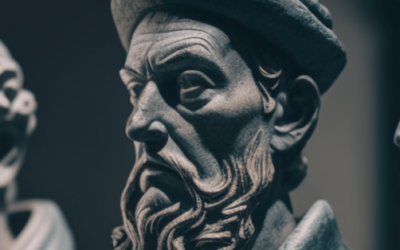- Salvation by faith and works
- Origen (185-254), “Whoever dies in his sins, even if he profess to believe in Christ, does not truly believe in him; and even if that which exists without works be called faith, such faith is dead in itself, as we read in the epistle bearing the name of James (Commentaries on John 19:6).
- Gregory of Nyssa (330-394), “Paul, joining righteousness to faith and weaving them together, constructs of them the breastplates for the infantryman, armoring the soldier properly and safely on both sides. A soldier cannot be considered safely armored when either shield is disjoined from the other. Faith without works of justice is not sufficient for salvation; neither is righteous living secure in itself of salvation, if it is disjoined from faith (Homilies on Ecclesiastes 8).
- Chrysostom (349-407), “He that believes in the Son has everlasting life.” Is it enough, then, to believe in the Son,’ someone will say, ‘in order to have everlasting life?’ By no means! Listen to Christ declare this himself when he says, ‘Not everyone who says to me, “Lord! Lord!” shall enter into the kingdom of heaven’, (Homilies on the Gospel of John 31:1).
- Salvation by faith alone
- Clement of Rome (?-110), “And we who through his will have been called in Christ Jesus are justified, not by ourselves, or through our wisdom or understanding or godliness, or the works that we have done in holiness of heart, but by faith, by which all men from the beginning have been justified by Almighty God, to whom be glory world without end. Amen.” (First Clement, 32-33).
- Irenaeus (120?-200), “Thus, then, they who are of faith shall be blessed with faithful Abraham, and these are the children of Abraham. Now God made promise of the earth to Abraham and his seed; yet neither Abraham nor his seed, that is, those who are justified by faith, do now receive any inheritance in it; but they shall receive it at the resurrection of the just. For God is true and faithful; and on this account He said, “Blessed are the meek, for they shall inherit the earth.” (Against Heresies, Book 5, chapter 32, par. 2).
- Augustine (354-430), “Before, however, all this had been accomplished, before the actual preaching of the gospel reaches the ends of all the earth . . . ‘If righteousness come by nature, then Christ died in vain.’ If, however, Christ did not die in vain, then human nature cannot by any means be justified and redeemed from God’s most righteous wrath-in a word, from punishment–except by faith and the sacrament of the blood of Christ,” (On Nature and Grace, Against Pelagius, 2, 4).
- Chrysostom (349-407), “But after saying that ‘it was excluded,’ he shows also, how. How then does he say it was excluded? ‘By what law? of works? Nay, but by the law of faith.’ See he calls the faith also a law delighting to keep to the names, and so allay the seeming novelty. But what is the ‘law of faith?’ It is, being saved by grace. Here he shows God’s power, in that He has not only saved, but has even justified, and led them to boasting, and this too without needing works, but looking for faith only.” (Homilies on Romans, 7, v. 27).
- Justin Martyr (100-165), “For Abraham was declared by God to be righteous, not on account of circumcision, but on account of faith. For before he was circumcised the following statement was made regarding him: ‘Abraham believed God, and it was accounted unto him for righteousness.'” (Justin Martyr, Dialogue with Trypho 92)
- Chrysostom (349-407) says by faith alone he looks to find mercy in the day of the Lord’s appearing. “Even the great teacher of the world who is wont to style himself last of saints and first of sinners, that he might stop the mouths of liars was compelled to set forth a list of his own labours; and in shewing that this account of his sufferings was of necessity, not of free will, he added “I am become a fool in glorying; ye have compelled me.”(2) I own myself wretched–aye thrice wretched. I am guilty of many errors. Through faith alone I look for finding some mercy in the day of the Lord’s appearing. I wish and I pray that I may follow the footprints of the holy Fathers, and I earnestly desire to keep undefiled the evangelic teaching which was in sum delivered to us by the holy Fathers assembled in council at the Bithynian Nicaea.”(Letters of the Blessed Theodoret, Bishop of Cyrus, Letter 83)
- Chrysostom (349-407) says we are purified by faith alone: “Perhaps those were present who of old found fault with him in the matter of Cornelius, and went in with him (on that occasion): for this reason he brings them forward as witnesses. “From old days,” he says, “did choose among you.” What means, “Among you?” Either, in Palestine, or, you being present. “By my mouth.” Observe how he shows that it was God speaking by him, and no human utterance. “And God, that knoweth the hearts, gave testimony unto them:” he refers them to the spiritual testimony: “by giving them the Holy Ghost even as unto us.” (v. 8.) Everywhere he puts the Gentiles upon a thorough equality. “And put no difference between us and them, having purified their hearts by faith.” (v. 9.) From faith alone, he says, they obtained the same gifts. This is also meant as a lesson to those (objectors); this is able to teach even them that faith only is needed, not works nor circumcision. For indeed they do not say all this only by way of apology for the Gentiles, but to teach (the Jewish believers) also to abandon the Law. However, at present this is not said. “Now therefore why tempt ye God, to put a yoke upon the neck of the disciples?” (John Chrysostom, Commentary on Acts 15.1)
- Ambrose (340?-397) speaking of our redemption and earthly riches say faith alone will accompany us. “Do not trust in riches; for all such things are left here, faith alone will accompany you. And righteousness indeed will go with you if faith has led the way. Why do riches entice you? “Ye were not redeemed with gold and silver,” with possessions, or silk garments, “from your vain conversation, but with the precious Blood of Christ. ” He then is rich who is an heir of God, a joint heir with Christ. Despise not the poor man, he has made you rich. ” This poor man cried, and the Lord heard him.” Do not reject a poor man, Christ when He was rich became poor, and became poor because of you, that by His poverty He might make you rich. Do not then as though rich exalt yourself, He sent forth His apostles without money,” (Ambrose, Letter 63, par. 87)
Examples of bad interpretations of Scripture by various Church Fathers
The Church Fathers did a great job of expounding on Scripture. They clarified, defined, and refuted. We owe a debt to...






